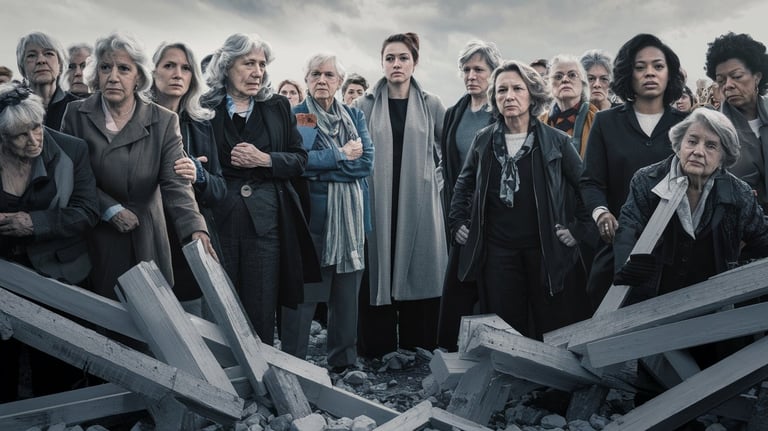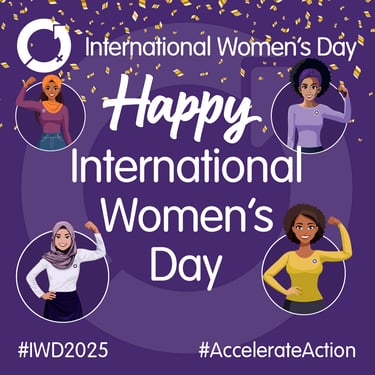The Aging White Woman’s Reckoning: Power, Privilege, and the Refusal to Let Go
4 min read
As aging strips white women of the privilege and visibility they once held, many refuse to confront the reality that their status was never fully earned. Instead of challenging the system that has discarded them, they cling to whiteness, lashing out at others in a futile attempt to reclaim lost power. While some adapt and find new ways forward, others become bitter gatekeepers, resisting the truth of their marginalisation. If International Women’s Day 2025 is truly about Accelerated Action, aging white women must stop fighting for a seat at a collapsing table and start dismantling the very system that turns on them.


International Women’s Day is about action – so why aren’t aging white women taking any?
Every year, International Women’s Day rolls around with its banners of empowerment, progress, and unity. This year’s slogan is Accelerate Action. But if women truly want to move forward, we need to ask: who is holding us back?
And the uncomfortable truth – one that most refuse to acknowledge – is that aging white women are part of the blockade.
The Shock of Aging: When Privilege Starts to Slip
For much of their lives, white women have occupied a space of relative advantage – benefiting from a system that prizes their whiteness, youth, and desirability. They have been seen, heard, prioritised. And even when they have been marginalised, they have been the face of feminism, the voice of women’s struggles, the default in conversations about gender.
But then, something happens.
They age.
And suddenly, they start to feel something unfamiliar: invisibility.
People talk over them. They are dismissed. Doors that once opened effortlessly now remain shut. They begin to experience the bare minimum of what non-white women – especially Black women – have dealt with all along.
This should be their moment of clarity. A wake-up call.
But instead: they double down.
A System That Never Loved You Back
For generations, white women have chosen whiteness over womanhood when it came to power.
They stood – and still stand – beside white men when it reinforces racism, capitalism, and oppression – even when it actively goes against them. They have bought and buy into the system, played and play the role, reaped and reap the benefits. And now they’ve hit a certain age – whether actually or visually – and the system is done with them.
They are no longer the fresh-faced ideal, no longer objects of desire, no longer seen. Their whiteness remains; they may even have money and status to go with it too – but it is not enough. Aging strips white women of their proximity to whiteness – not in skin colour, but in social currency. The privileges that came with being the epitome of whiteness as manifested in youth begin to erode, exposing the limits of whiteness when detached from “beauty”.
Yet, instead of questioning the system of white supremacy that has now discarded them, many double down, cling tighter, and lash out – at feminists, at younger women, at women of colour. Because to accept reality would mean acknowledging that their security and status were never entirely earned but given – and often at the expense of others.
That’s a hard pill to swallow. So, instead of fighting back against their oppression and working with others to dismantle it, they fight to regain their status within it.
The Choice – Wake Up or Stay Delusional
Now, some aging white women recognise the shift that comes with age and move differently. They find new ways to exist in the world, understanding that while their youth has faded, their whiteness still offers them a softer landing than most.
But others? They become the bitter gatekeepers; Karens; aging ‘cool girls’ desperately competing to outdo younger women; conservative voters who decide that if they can’t hold power anymore, they’ll make sure no one else does either. They cling even harder to the systems that once upheld them, even as those systems start to discard them.
They would rather uphold the very system that is chewing them up and spitting them out than let go of it and admit that the whole thing was rigged from the start. They would rather rage at the world and police young women’s feminism than confront their own irrelevance in a capitalist, ableist, white-supremacist society.
Because aligning with other marginalised groups would mean relinquishing the last vestiges of privilege they have left, they take what is happening to them as a personal attack. Rather than recognising this as the system doing what the system does, they convince themselves they are being uniquely victimised. But the truth is, they are not being singled out – their new place within this still functioning system means they are now simply being treated like a “woman of colour”.
And having spent their life refusing to acknowledge the bigger picture that now keeps them locked into the very systems that oppress them, they hold on to this belief that it is an individual problem, which they can fix – with more skincare, cosmetics, yoga, surgery – more 'reinvention' to white patriarchal standards and desires. This illusion of control prevents them from taking meaningful action. They’d rather be kept distracted by personal solutions than confront the reality of it being a systemic issue that needs dismantling and fight for collective change.
The Poetic Ending They Refuse to See
If International Women’s Day is about action – and not just action, but accelerated action, then we need to start seeing it from aging white women. Because if aging white women were actually serious about change, they would be looking to dismantle the systems that have now inevitably betrayed them, instead of desperately trying to force their way back in, demanding to be served by them once again.


What do you think...?


